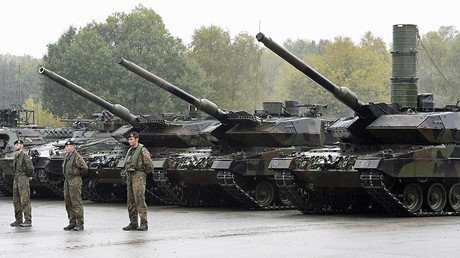German teens enlist in record numbers thanks to social media drive
Germany now has a record number of children registering to join its army following an intensive social media campaign. More than 2,000 soldiers under the age of 18 served in 2017, according to new figures.
The news has led to renewed calls for the practice to be abolished. Speaking to RT Martin Dolzer, a Left Party lawmaker from Hamburg, said: “The people, who are underage, they should not be urged to get into the army. This contradicts the United Nations regulation and it’s not a good development.”
The stats show the number of teenagers under the age of 18 that joined the army ranks for a six-month trial period last year exceeded 2,000 for the first time. A total of 2,128 minors served in the Bundeswehr in 2017, including 448 girls. Germany’s one of the few countries where people under 18 can register their interest in signing up.
The numbers have skyrocketed in the last five years since the compulsory military service for men was abolished in 2011. That year only 689 ‘underage’ people volunteered to join the military. The steady increase in children willing to get a taste of military service is being put down to online advertising campaigns targeted at teenagers.
While these recruits have a limited access to weapons and cannot be sent on missions overseas, the practice sparked concerns among human rights advocates and the UN Committee on the Rights of Children, which in 2014 urged Germany to stop the recruitment of minors noting that “some advertising campaigns for the armed forces specifically target children.”
READ MORE: ‘We advance our interests by breaking international law’ – Left-wing German lawmaker
However, according to the country’s defense forces, the practice “fully adheres to its obligations under international law, such as the 1989 UN Convention on the Rights of the Child.”
Left Party MP Evrin Sommer, who was behind the information request, told the Rheinische Post (RP) that Germany has no moral authority to criticize the use of child soldiers.
“The German government is endangering its own efforts towards an international ban on the use of child soldiers,” Sommer said. The Defense Ministry defended the controversial practice, stressing that minors who volunteered for the army are eligible to leave service “any time within the first six months without giving a reason.”
Contrary to the rising number of under-18 recruits, the overall number of volunteers who joined the military under 23-month service contracts between January and August 2017 fell 15 percent in comparison to the previous year.
Dolzer, a lawmaker from Hamburg, argued that the reason the army remains unattractive in the eyes of the general public, despite all its publicity campaigns, is that Germany’s foreign policy is “not peaceful enough.”
“The main problem is that if you do a foreign policy which is based on dialog you don’t need such a strong army or so many soldiers. I think this is the main problem behind it,” Dolzer told RT, noting that those who do opt for the army service in Germany mostly come from unprivileged backgrounds, being unable to find a job elsewhere or go to a university.
Dolzer says he finds the concept of child soldiers “unacceptable.”















